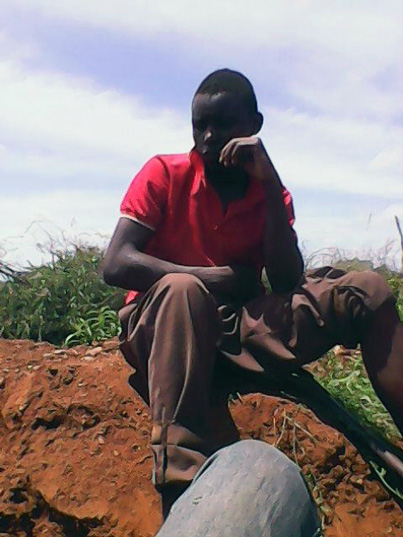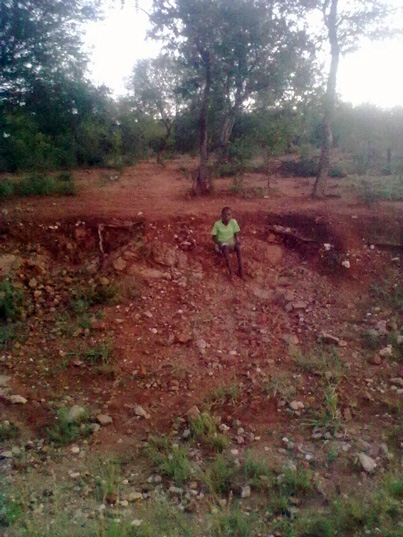- About
- Topics
- Picks
- Audio
- Story
- In-Depth
- Opinion
- News
- Donate
- Signup for our newsletterOur Editors' Best Picks.Send
Read, Debate: Engage.
| February 24, 2015 | |
|---|---|
| topic: | Sustainable Consumption |
| located: | Zimbabwe |
| by: | Henri-Count Evans |
It is an early Saturday morning filled with hyper energy as hordes of men and women hustle into what used to be a thick bush that is now an open and barren track of lifeless land.
The scene in Mberengwa North, one of Zimbabwe’s gold rich districts, is a hive of activity with people clutching shovels, picks and buckets all in search of the precious yellow mineral that is gold.
In Zimbabwe, widespread unregulated gold panning has devastatingly exhausted both the environment and the society. Trails of open pits and heaps of soil are visible as one walks past illegal gold panning sites such Mberengwa, Esigodini, Kwekwe, Kadoma, Zvishavane and Filabusi.
There is no joy in the land and the rivers, when the gold panners have ravaged through their surrounds. The panners leave a shadow of vegetation destruction, as well as an oasis of pollution and litter.
Prime farming land has not been spared the wrath of the illegal gold panners; popularly referred to as ‘Makorokoza’ in local Zimbabwean circles. The name given to these self-made miners symbolises their lawlessness and immoral behaviour.
In most of the gold panning areas many cropping fields have been dug up and are no longer useful for any form of agriculture. Many of the subsistence farmers in these parts stand helplessly disgruntled because of the illegal miners’ activities.
“They invaded my field five weeks after I had planted my maize and groundnuts,” says Ruth Shoko, a widow from Mberengwa North resettlement area.
“These illegal gold miners do not respect anyone and they do not care about the impact of the damage they cause,” she adds.
As Shoko narrates her ordeal, visible marks of pain and hopelessness written all over her face.
When asked why the villagers were not eager to report the illegal gold miners who destroy their fields to the police, Shoko cited fear of victimisation as the greatest silencer.
“If the gold panners get to know that you have reported them, then can kill you or burn your home. So we cannot risk that happening to us. It is better to just watch and let them go,” she says.
“In many cases justice is hard to come by as the police cannot be relied upon, especially the local ones,” lamented Thabiso Moyo, a villager from Filabusi district that has a heavy presence of illegal gold panners in the Matabeleland South Province.
“The law-enforcers are corrupt and tend to take bribes from the illegal miners, who use this situation to their advantage. The illegal miners in this area are untouchable”.
The frightening illegal gold panners are notorious for their criminal activities and their unquenchable thirst for violence and blood.
“In the first week of February, at a gold panning site called Mamengo, the panners had a confrontation with unarmed police officers who tried to disperse them. However, some police officers were beaten during the confrontation and had to flee from the gangs,” explains Chido Dube, a villager from Mberengwa North.
Dube witnessed the violence firsthand because her home is near the place where the violent confrontation took place.
“The illegal miners were only chased away from Mamengo after Zimbabwe Republic Police’s armed anti-riot support unit had been called to disperse them”
In this rainy season, most villagers living around gold panning areas have lost their livestock which usually fall into unclosed pits that are left by the illegal miners.
The open pits have become a hazard even to humans as people often fall into them during the night. Some of the pits are as deep as six metres.
The growth of illegal gold mining has encouraged the eruption of informal shanty settlements around the gold producing areas. There are no toilets or sources of clean water in such settlements, hence exposing the community to diseases.
Widespread cases of malaria, diarrhea, cholera and sexually transmitted diseases have been reported in such informal settlements.
For example, at one such settlement called Yorks centre in Mberengwa, a former farm township, prostitution has become a brisk business with young girls shunning their homes and resorting to sex with illegal gold panners in return for some money.
The nearest health centres have been battling against sexually transmitted infections (STIs) that are rampant amongst the panners and their partners.
“We have treated quite a number of girls from in and around the Yorks area who have been infected with sexually transmitted diseases and gonorrhea being the most widespread,” said a nurse from Mberengwa District who requested anonymity due to professional reasons.
“Unfortunately, one in a handful of cases come to our attention. I suspect most infected people go on to infect other people in a web of infections as panners move from place to place.”
Unregulated gold mining activities have adversely affected major rivers in gold producing areas. Notably, the Umzingwane river in Esigodini, Runde river in Zvishavane, Save river Masvingo and Mwenezi river stretching from Mberengwa into Masvingo.
The Umzingwane river supplies water to Bulawayo, Gwanda and Esigodini while Runde supplies water to Zvishavane town and Mberengwa and Mwenezi supplies water to Manyuchi Dam in Mberengwa, a dam that has been ear-marked for hydro-electricity generation. Wild animals and livestock also rely on these rivers for drinking water.
These rivers are heavily polluted with mercury and cyanide discharged into them by the illegal gold miners. The health of people, aquatic life and livestock reliant on these rivers for their water supplies has been compromised.
The people living downstream are the worst affected. It takes times for the negative impacts of water pollution by chemicals to manifest in humans, but aquatic life has been heavily affected already as cases of poisoned fish have been reported in Mberengwa and Zvishavane areas.
“Irrigation schemes and community vegetable gardens that have been dependent on these rivers are manifesting signs of stress due to compromised water quality and reduced water quality due to river siltation,” bemoans Ottilia Moyo, an environmental scientist based in Bulawayo.
“As the gold panners are digging along the riverbeds, they have been disturbing soil stability and have caused the river banks to collapse resulting in siltation of the river and catchment dams thereby reducing water quantity. This has also reduced the available land for stream bank cultivation and gardening”.
In Zimbabwe, gold mining is criminalised, but the police and the regulatory authorities have failed to implement the laws and enforce compliance. Environmental law expert, Nyaradzo Makombe attributes the lack of compliance and enforcement to conflict of interests in the country’s legal regime and institutions. The government has gone into an over-drive preaching empowerment and this so-called empowerment sometimes is done at the expense of the environment.
The resource-stressed state-run Environmental Management Agency has admitted that it is incapacitated as it has only one environmental officer per district.
Professor Sheunesu Mupepereki, the immediate past Board of Directors Chairman of the Environmental Management Agency, encouraged the government to craft policies will transform illegal gold panning into small-scale mining consortiums that are well-equipped and contribute towards sustainable development in communities.
Zimbabwe has been continuously losing potential revenue as gold produced by the unregulated illegal gold panners rarely finds its way into the official gold buying company Fidelity Printers. More often than not panners prefer to sell their gold to informal buyers who smuggle the precious mineral out of the country, prejudicing the country of benefits from its own resources.
By copying the embed code below, you agree to adhere to our republishing guidelines.


